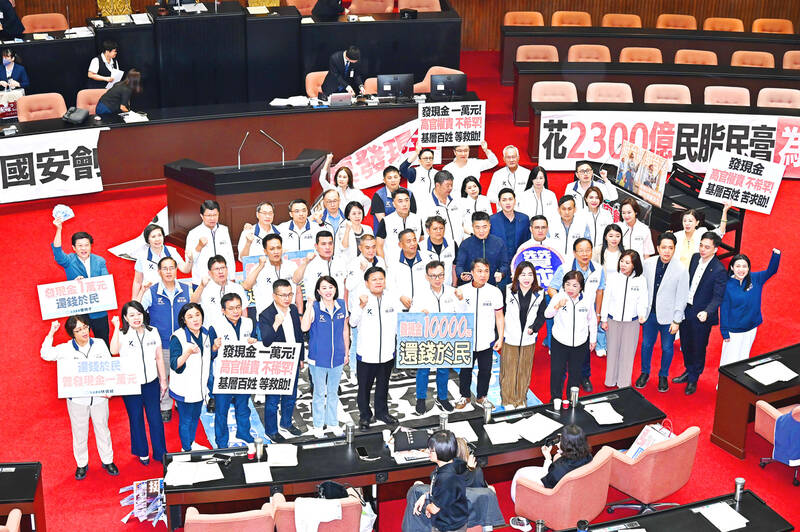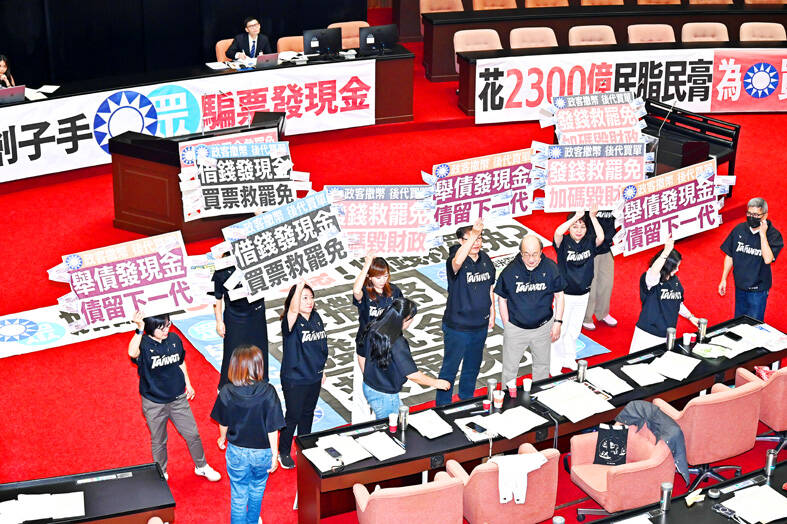The legislature yesterday passed the third reading of the government’s special relief package, including approving a NT$10,000 (US$342) cash handout proposed by the Chinese Nationalist Party (KMT), which raised the package’s total ceiling from NT$410 billion to NT$545 billion.
The Special Act for Strengthening Economic, Social and National Security Resilience in Response to International Circumstances (因應國際情勢強化經濟社會及國土安全韌性特別條例) was proposed in April to counter the impacts of US President Donald Trump’s tariffs.
The special budget includes NT$93 billion for economic resilience, NT$150 billion for whole-of-society defense resilience and NT$167 billion for social support, which includes a NT$100 billion subsidy for Taiwan Power Co (台電, Taipower), and NT$20 billion and NT$10 billion to subsidize national health insurance and labor insurance respectively.

Photo: Tu Chien-jung, Taipei Times
The KMT was originally against the NT$150 billion budget for whole-of-society defense resilience and the NT$100 billion subsidy for Taipower. It had proposed its own version of the special budget bill, which included NT$10,000 cash handouts.
The opposition parties did not submit a joint proposal for amendments to the bill, as the KMT and the Taiwan People’s Party (TPP) failed to reach a consensus on the value of the cash handouts.
The TPP wanted to allocate NT$140 billion for the cash handouts, or NT$6,000 to every Taiwanese. It also proposed slashing the Taipower subsidy.

Photo: Tu Chien-jung, Taipei Times
The KMT legislative caucus yesterday endorsed the NT$150 billion whole-of-society defense budget, saying that it was a necessary expense for the nation’s defense. It stood its ground on scrapping the NT$100 billion subsidy for Taipower and allocating NT$235 billion for a universal NT$10,000 cash handout.
All subsequent whole-of-society defense budgets under the special fund would be closely scrutinized to ensure that the public is aware of where taxpayer money is being spent, it said.
KMT caucus whip Fu Kun-chi (傅崑萁) said that the Democratic Progressive Party (DPP) government owed the public cash handouts, as it had raised more than NT$1.87 trillion in tax surpluses over the past four years, adding that the money could give disadvantaged families money for groceries for several weeks.
Although the KMT version was not fully supported by the TPP, it received eight TPP votes for a total of 60 votes. That exceeded the DPP’s 44 opposing votes. Six DPP lawmakers did not vote.
KMT Legislator Hsieh Lung-chieh (謝龍介) said giving money back to the public is reasonable when the nation enjoys good fiscal health.
KMT caucus secretary-general Wang Hung-wei (王鴻薇) said cuts to Taipower’s subsidies should be of no concern, since the Ministry of Economic Affairs already said that electricity prices would go up.
TPP Chairman Huang Kuo-chang (黃國昌) said the DPP’s use of renewable energy for corruption is why the formerly profitable Taipower is struggling.
The DPP had no problem doling out stimulus checks to people during the 2008 recession, he said.
TPP Legislator Lin Kuo-cheng (林國成) said the party’s budget stance is not a bid to pander to voters, but to give Taiwanese a needed boost to face high tariffs, fluctuation in currency markets and increasing strain on small and medium-sized enterprises.
DPP chief executive Rosalia Wu (吳思瑤) said the KMT’s cash handout plan, which would cost NT$235 billion, is an attempt to bribe voters ahead of the recall elections.
The KMT would not have backtracked on blocking the whole-of-society defense resilience budget if not for the DPP’s resistance and the threat of the recalls, she added.
The third reading stated that the funds allocated by the package could be used until December 2027, while funding for the cash handouts must be used before Oct. 31.
The act and related funding can be extended.
Executive Yuan spokesperson Michelle Lee (李慧芝) yesterday said the Executive Yuan thanks the legislature for supporting the whole-of-society defense resilience plan, but that raising national debt for future generations to pay for the cash handout was inappropriate.
Cutting the subsidy for Taipower would also leave it in a tight financial situation, and the electricity price review committee might have to raise electricity prices, impacting industries and people’s livelihoods, she said.
Additional reporting by Lin Hsin-han, Hollie Younger,
Fion Khan and Lery Hiciano

AGING: As of last month, people aged 65 or older accounted for 20.06 percent of the total population and the number of couples who got married fell by 18,685 from 2024 Taiwan has surpassed South Korea as the country least willing to have children, with an annual crude birthrate of 4.62 per 1,000 people, Ministry of the Interior data showed yesterday. The nation was previously ranked the second-lowest country in terms of total fertility rate, or the average number of children a woman has in her lifetime. However, South Korea’s fertility rate began to recover from 2023, with total fertility rate rising from 0.72 and estimated to reach 0.82 to 0.85 by last year, and the crude birthrate projected at 6.7 per 1,000 people. Japan’s crude birthrate was projected to fall below six,

US President Donald Trump in an interview with the New York Times published on Thursday said that “it’s up to” Chinese President Xi Jinping (習近平) what China does on Taiwan, but that he would be “very unhappy” with a change in the “status quo.” “He [Xi] considers it to be a part of China, and that’s up to him what he’s going to be doing, but I’ve expressed to him that I would be very unhappy if he did that, and I don’t think he’ll do that. I hope he doesn’t do that,” Trump said. Trump made the comments in the context

SELF-DEFENSE: Tokyo has accelerated its spending goal and its defense minister said the nation needs to discuss whether it should develop nuclear-powered submarines China is ramping up objections to what it sees as Japan’s desire to acquire nuclear weapons, despite Tokyo’s longstanding renunciation of such arms, deepening another fissure in the two neighbors’ increasingly tense ties. In what appears to be a concerted effort, China’s foreign and defense ministries issued statements on Thursday condemning alleged remilitarism efforts by Tokyo. The remarks came as two of the country’s top think tanks jointly issued a 29-page report framing actions by “right-wing forces” in Japan as posing a “serious threat” to world peace. While that report did not define “right-wing forces,” the Chinese Ministry of Foreign Affairs was

PREPAREDNESS: Given the difficulty of importing ammunition during wartime, the Ministry of National Defense said it would prioritize ‘coproduction’ partnerships A newly formed unit of the Marine Corps tasked with land-based security operations has recently replaced its aging, domestically produced rifles with more advanced, US-made M4A1 rifles, a source said yesterday. The unnamed source familiar with the matter said the First Security Battalion of the Marine Corps’ Air Defense and Base Guard Group has replaced its older T65K2 rifles, which have been in service since the late 1980s, with the newly received M4A1s. The source did not say exactly when the upgrade took place or how many M4A1s were issued to the battalion. The confirmation came after Chinese-language media reported